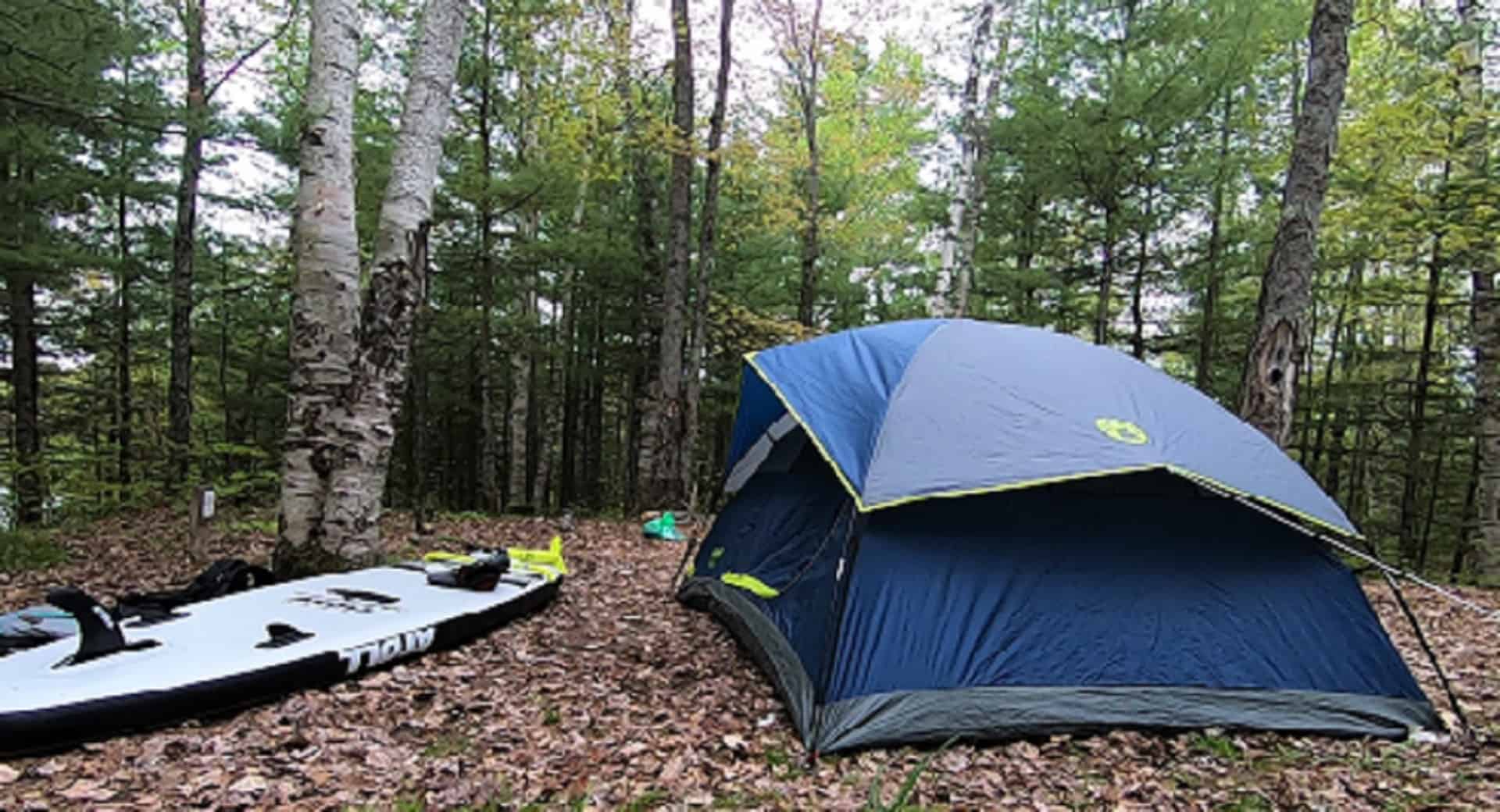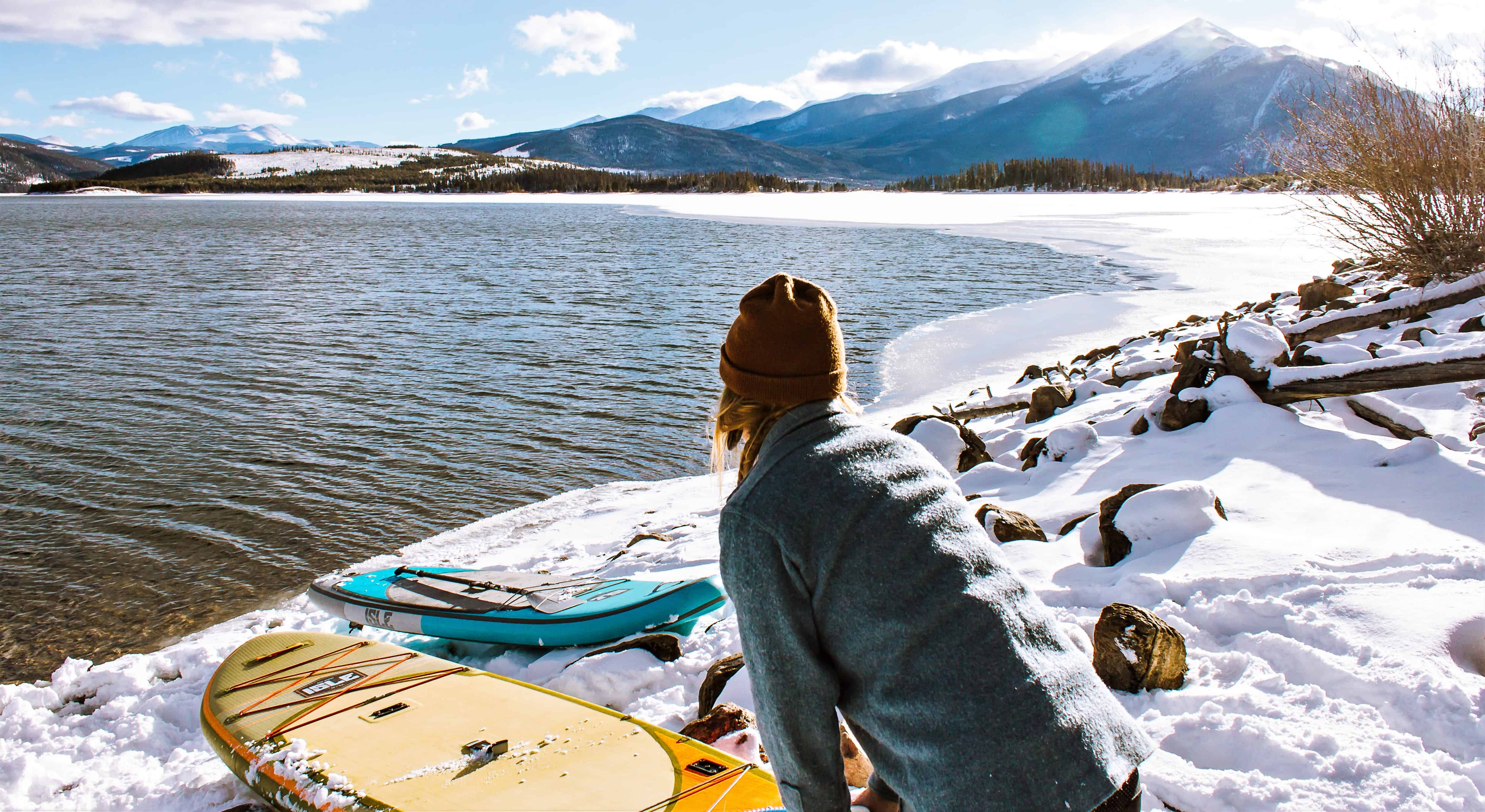Choosing a Camping Paddle Board
Once I started paddle boarding it was only a matter of time before I begin looking at a paddle board for overnight camping trips. I have been an avid hiker since the early 80’s. The idea of loading up a paddle board and going on a week-long paddling expedition lit up my mind.
And once I tried SUP camping I was hooked. Another fun activity to get me on the water with my paddle board!
But what was a good paddle board for an overnight trip? So I did my research and found out what I needed in a SUP for camping.
Now, with some experience under my belt, I can tell you everything you need to know.
Let’s look into what all this means so you can find a SUP you are happy with. Like me.

Consider a Touring Paddle Board

Check out: Best inflatable paddle boards for camping
I would start by looking at touring paddle boards. Touring paddle boards are designed for paddling long distances. They resemble racing boards but are wider. You can think of touring boards as a hybrid between race boards and all-around boards.
Touring boards glide easier than all-around boards. That means you cover more distance with each paddle stroke. And when you are paddling all day with a board full of camping gear that is a good thing.
What makes a touring board glide so well?
- Narrow width
- Longer length
- Streamlined profile
- Less rocker
- Plenty of float
Do you need a touring board for SUP camping? No. An all-around board will often work okay. But any board you intend to use SUP camping should paddle and glide easy. And some all-around boards do glide easier than others.
It just depends on how hard you want to work. If you are serious about SUP camping sooner or later you will end up buying a touring paddle board.
Touring Paddle Boards for SUP Camping

Pros
- Paddle easier
- Glide easier
- Move a greater distance with each stroke
- Have plenty of float
- Have enough room on deck for gear
- Are stable enough for most paddlers
Cons
- Some paddlers feel unstable on a 30″ wide paddle board

Camping SUP Board Considerations:
1. Length and Width
The length and width of a SUP board will determine how easily it glides in the water. If you are paddling all day with a deck full of camping gear you want a paddle board that glides well.
The best touring paddle boards are 12’6″ to 14′ in length. And they are 30-32″ in width. Those are your guidelines.
2. Float
Having a paddle board with enough float is the first and most important characteristic to look for. Your board needs enough float to carry your body weight and all your camping gear.
And it should have more float than needed. Here is why: If your paddle board does not have enough float it will sit low in the water. It will drag, paddle hard and feel unstable.
In other words it will perform exactly how we DON’T want a board to perform on a paddling trip.
It is typical for me to carry 50lbs of gear. It depends on the type of trip I am taking and how comfortable I want to be. I weigh 200lbs. So when I am sup camping I typically take a paddle board that has a weight capacity of no less than 300lbs.
3. Large Deck
All your camping gear will be on the deck of your paddle board so you want a large deck. And you don’t want to be cramped for standing room. There should be plenty of room for you to move into a surf stance or take a few steps forward or backward.
Most touring paddle board are 12’6″ long giving you extra room on the nose and tail for storing gear. All-around paddle boards often have more deck space because of a wider profile throughout the nose and tail.
4. Gear Tie-Downs
Tie-down attachment points are needed to strap all your gear securely to your board. A good camping sup will have bungee tie down systems on the nose and the tail of the board.
Take the mystery out of how you are going to secure all that gear to your board. I suggest doing a dry packing test in your backyard. Pack your gear in dry bags and see how they fit on your board.
It would be helpful to practice paddling in the water with your board fully loaded with gear. You might have to move your gear around and experiment a bit to get the proper balance.
5. Durability
Durability is always important be even more so when you are isolated on a wilderness sup camping trip. Inflatable paddle boards are more durable than hard paddle boards. Inflatables will easily handle collisions with logs, tree stumps and rocks.
With fins you need to be careful entering shallow rocky water. I always carry an extra center fin when sup camping just to be safe.
Quality is synonymous with durability. You get what you pay for and I would not take a cheap paddle board on a sup camping trip.
6. Board Weight
When paddle board camping you may have to portage or carry your board and gear over land. This is especially true in the late summer and fall when rivers are running low. I have also come across large log jams that had to be carefully crossed by foot. So having a lighter weight paddle board can be an asset when sup camping.
7. Price
No need to say why price is important.


